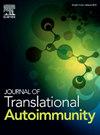Serum test for secretory component-containing anti-citrullinated protein antibodies as a novel prognostic tool in rheumatoid arthritis at-risk subjects
IF 3.6
Q2 IMMUNOLOGY
引用次数: 0
Abstract
Individuals with autoantibodies against citrullinated proteins (ACPA) and musculoskeletal symptoms face increased risk of developing rheumatoid arthritis (RA). There are knowledge gaps concerning who will develop disease, and predictors of RA onset are highly warranted. A mucosal origin hypothesis in RA is gaining increasing support, for instance by a previous study showing that secretory component-containing ACPA (SC ACPA) in the circulation are prognostic for RA onset. This study aimed to confirm the prognostic value of serum SC ACPA in a large cohort of symptomatic at-risk subjects and to establish a cutoff level for the prognostic use of SC ACPA testing.
Baseline sera from an observational prospective cohort of IgG ACPA positive individuals with musculoskeletal complaints (Karolinska cohort, n = 266) were tested for SC ACPA by ELISA. SC ACPA levels were increased among subjects subsequently developing arthritis (n = 100, median 62 arbitrary units (AU)/mL) compared to those who did not (n = 166, median 40 AU/mL; p < 0.001). A cutoff level for the optimal discrimination concerning future arthritis onset was established by Youden's index, resulting in 81 subjects (30 %) testing positive for SC ACPA, whereof 45 (56 %) progressed to arthritis. Among those testing negative (n = 185), significantly fewer progressed (n = 55, 30 %; p < 0.001). This cutoff was then tested in the previously studied at-risk cohort (n = 82), revealing similar prognostic performance in both cohorts (sensitivity 45 % and 41 %; specificity 78 % and 81 %). We conclude that serum SC ACPA testing is of potential clinical value in symptomatic at-risk subjects and strengthens the mucosal association in RA development.
血清检测含有抗瓜氨酸化蛋白抗体的分泌成分作为类风湿关节炎危险受试者的一种新的预后工具
具有抗瓜氨酸化蛋白(ACPA)自身抗体和肌肉骨骼症状的个体患类风湿关节炎(RA)的风险增加。关于谁将会发展为疾病存在知识空白,而类风湿关节炎发病的预测因素是非常必要的。RA的粘膜起源假说正获得越来越多的支持,例如,先前的一项研究表明,循环中含有分泌成分ACPA (SC ACPA)是RA发病的预后因素。本研究旨在确认血清SC ACPA在一大群有症状的高危受试者中的预后价值,并建立SC ACPA检测用于预后的临界值。通过ELISA检测具有肌肉骨骼疾患的IgG ACPA阳性个体的基线血清(卡罗林斯卡队列,n = 266)。与未发生关节炎的受试者(n = 166,中位数40 AU/mL; p < 0.001)相比,随后发生关节炎的受试者SC ACPA水平升高(n = 100,中位数62任意单位(AU)/mL)。通过约登指数(Youden's index)建立了最佳鉴别未来关节炎发病的截止水平,结果81名受试者(30%)SC ACPA检测呈阳性,其中45名(56%)进展为关节炎。在检测呈阴性的患者(n = 185)中,进展明显较少(n = 55,30 %; p < 0.001)。然后在先前研究的高危队列(n = 82)中测试该截止值,结果显示两个队列的预后表现相似(敏感性为45%和41%;特异性为78%和81%)。我们得出结论,血清SC ACPA检测在有症状的高危受试者中具有潜在的临床价值,并加强了RA发展中的粘膜相关性。
本文章由计算机程序翻译,如有差异,请以英文原文为准。
求助全文
约1分钟内获得全文
求助全文
来源期刊

Journal of Translational Autoimmunity
Medicine-Immunology and Allergy
CiteScore
7.80
自引率
2.60%
发文量
33
审稿时长
55 days
 求助内容:
求助内容: 应助结果提醒方式:
应助结果提醒方式:


